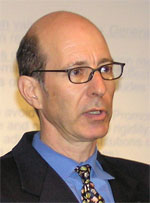A few of the more interesting opinion pieces, I've seen recently.
A few of the more interesting opinion pieces I've seen recently
 | Barbara Eihrenriech on "Wretched and Excess" Santa Claus is coming . . . to Wall Street. Goldman Sachs’ employees are getting bonuses that average over $600,000 a head and run up to $100 million for some of the top guys, though it’s a safe bet the cleaning crew won’t be seeing any of this largesse. Holiday parties are another measure of the frenzy in the financial and tech industries, reaching levels of excess not seen since the dot-com era: Hand-rolled cigars, $500 a shot champagne and caviar servings, “signature cocktails” like pomegranate martinis, custom disco lighting, and bevies of near-naked elves. |
 | Robert Reich. "An Introduction to Populist Economics"
|
 | Thomas Palley, "The Economics and Politics of Trade Deficits" The real contribution of the U.S. to the trade deficit, which is international economic policy. Over the last twenty-five years successive Republican and Democratic administrations have assiduously created a global economy in which goods, capital, finance, and corporations are free to move. This new system has boosted profits by allowing companies to establish export-production platforms in low wage countries and batter America’s unions into submission. Big box retailers, such as Wal-Mart, have also supported the new arrangements since they benefit from global sourcing. The purpose of the new system has always been access to cheap low wage production. It has never been expanded balanced trade. |
 | Harold Meyerson "The Populist Persuasion" The new-model Democrats who emerged from the 2006 elections may differ on cultural questions, how to get out of Iraq, and hiking taxes on the rich. Some of their differences -- such as those over warrantless wiretapping -- may lead to real internal conflict. Most won't -- either because the differences aren't that great, or the issues are ones that the party leadership needn't bring to a vote. What unites the party is a populist perspective that follows as the night the day the current era of Republican-sponsored plutocracy. Can the Democrats suppress their cultural differences and stress their economic commonalities, as they did in the days of their New Deal majorities? Can they win back the working-class whites who've been lost to them since the days of Robert Kennedy? Those are long-term challenges, but this year's elections certainly put the Democrats on that road. |

No comments:
Post a Comment